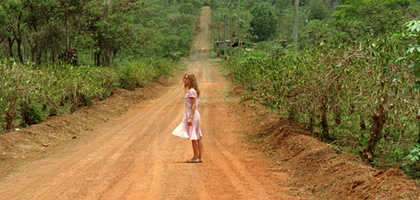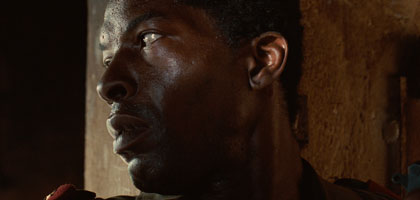Primary navigation


Claire Denis’ new film blends her ensemble-driven style with an unashamed star vehicle for Isabelle Huppert, as a plantation owner adrift in a civil war in an unnamed African country. By Adrian Martin
Claire Denis’ films aspire to a crystalline purity. Even when packed with the stuff of social and political unrest – war, murder, racial tension, unemployment, refugees, families in crisis – they give the sense of having dropped, in the course of their elaboration, whatever ‘message’ they may have intended at the outset. What remains, in the end, is a cryptic diagram of bodies and desires, environments and landscapes, confrontations and evasions, things said and unsaid. At its best (Beau travail, Vendredi soir, 35 Shots of Rum), Denis’ cinema is compelling in its skeletal purity, beckoning viewers to enter the work and fill the gaps with their own imaginations. When less successful (as in Nenette and Boni), the films can seem thin and strained.
White Material is at once an extremely physical and utterly abstract political melodrama. Working for the first time with novelist Marie N’Diaye rather than her usual script collaborator Jean-Pol Fargeau, Denis deliberately leaves obscure the exact year in which the action unfolds, or even the precise location in Africa. The situation that is so vividly sketched here – rebels versus militia, as workaday citizens flee for their lives and are often caught in the crossfire – would appear to be an amalgam of many moments in contemporary history: Rwanda, Angola, Indonesia… The conflict is, to use a much-abused word, universal; Denis aims for a level of generalised metaphor, but always through very precise, concrete details. She is careful, too, not to take sides, at least on the most obvious level of the dramatisation; only in fleeting moments like the final shot (when a soldier secretes the red beret which is the memoir-token of the rebel leader known as ‘the Boxer’) do we feel her natural sympathy for the rebels emerge.
Of course, Africa has special and specific significance for Denis, as announced by her debut feature Chocolat (1988), which took off from autobiographical experience. The continent’s culture and its transnational mutations form a constant presence and reference in her work. In White Material, as always, Denis takes an oblique rather than frontal angle; she truly puts the ‘post’ into post-colonial, as the primal scene of colonial encounter and trauma is never quite as intriguing to her as the often subtle aftershocks of a faded imperial expansion. Hence the story here – and certainly the power-play of white dominating black – is virtually over as soon as it begins, the ‘white material’ (the title refers to a cigarette lighter) already in tatters. We first see Maria (Isabelle Huppert) alone on a road, already divested of whatever colonial aura she once may have possessed, and from that point the action (such as it is) is a bleak body-countdown to total devastation. Yet the actual depiction of violence is restrained, unspectacular, almost Bressonian; blood doesn’t burst from sudden wounds, but seeps slowly through clothes, or is listlessly bathed in by children.
Maria might seem to be a distant relative of Bette Davis in any number of 1930s and ’40s melodramas, or of the heroine of Doris Lessing’s classic 1950 novel The Grass Is Singing, which Huppert initially wanted Denis to adapt. (It was filmed by Michael Raeburn in 1981, with Karen Black.) White Material focuses on Maria’s determination and perseverance, but it never romanticises her. Maria’s stubborn wilfulness and her blindness to the social situation around her – not to mention its horrible effects on everyone close to her – create a bubble around this character; instead of empathising with her, we are invited to take up a critical distance.
Curiously, the ultimate tone of the piece, at least on an intellectual plane, is closer to Richard Fleischer’s much-derided slavery epic Mandingo (1975) than it is to most melodramas centred on plucky women; in a Denis diagram, typically, we watch all the figures flail around inside the contradictions of their personal and social positions. An emblematic character, in this respect, is Maria’s father-in-law Henri (Michel Subor), who, while representing the imperial patriach taking up space in a foreign land, is an oddly passive, even benign presence (frequently seen near-naked) who speaks of Africa as the only true home he has ever known; indeed, all references to France in the film conjure it as some ghostly, unimaginable, lost point of origin for these ‘white materials’.

Isaach De Bankolé
Ultimately, Denis presents a ‘history of violence’ that has more in common with Lord of the Flies (novel or films) or Philippe Grandrieux’s paroxysmic La Vie nouvelle (2002) than with any Hollywood melodrama past or present. Here violence is a contagious, dehumanising force that sweeps everybody up in its psychotic madness, especially the troubled young Manuel (Nicolas Duvauchelle incarnating a character who in the 1990s would have been played for Denis by Grégoire Colin). At the symbolic centre of this maelstrom is the fascinating, mostly silent, largely inactive, brooding figure of the Boxer (Isaach De Bankolé), who – like Ben Gazzara in one of Denis’ favourite films, John Cassavetes’ The Killing of a Chinese Bookie – seems to be virtually a dead man from the first moment we glimpse him, his life draining away. He is in the process of passing over into the realm of myth, as a similarly wounded Johnny Depp did in Jarmusch’s Dead Man.
Confident but somehow never completely satisfying, White Material seems to suffer from a tension between its status as a star vehicle (though Huppert is superb) and Denis’ usual ensemble-driven proclivities. Some of the film’s most powerful scenes – such as Manuel’s brutalisation at the hands of two kids – come when the plot wanders away from Maria’s point-of-view; Denis’ relief at being able to stage her usual explorations off the linear track of the story is palpable. Yet these divagations never quite weave the sort of polyphony (in both image and sound) that – at its height (eg in Beau travail) – brings Denis close in artistry to Terrence Malick; the fuller pattern that might have emerged from a freer treatment feels shrunken, truncated. An early scene is indicative of both the promise and the problems inherent in the project: Maria on a motorbike joins a long line of such movement images in Denis’ work, but the depiction of the character’s exhilaration (hands thrust in the air, wind in her face) tends to rather weary cliché.
Although White Material achieves the director’s trademark dreamy fluidity – coaxing even the worst sticklers for narrative clarity to go with the flow and ignore strict demarcations between past and present, reality and fantasy – its structure isn’t half as daring as, say, that of her 2004 film The Intruder (L’intrus), where (as Raúl Ruiz would put it) the images created the narrative, rather than vice versa. Denis does employ the casual, even brutal form of exposition that suits her best: crucial information is conveyed on the fly, in glimpsed details (the survival kits strewn on the ground after a helicopter passes) or mysteriously brief, unanchored insertions of voiceover commentary (as when two unidentified locals discuss the white population).
However, like all her films, White Material repays repeat viewings, and grows with them. Not only do the more obscure or offhand pieces of the plot make more sense a second or third time around, but the already thick mood deepens and expands. Denis is a master of rhythm – here, an oceanic, slow throb that’s remarkably sustained over feature length – and of the fusion of image and music. The score by her frequent collaborators Tindersticks is reminiscent of Nick Cave and Warren Ellis’ music for John Hillcoat’s savage Australian Western The Proposition: violin, harmonium and plucked strings pursue a hypnotic, cyclical succession of chords.
Both in its overall structure and its incidental details, White Material admirably conveys the vision of a society in disarray, flying apart at every seam. In Denis’ Africa, there really is no place like home.
Claire Denis talks about filming in Africa on page 51 of the July 2010 issue of ‘Sight & Sound’
Sight & Sound’s best films of the 2009 including Denis' 35 Shots of Rum (January 2010)
Shoot him again: Nick James catches White Material at the Toronto Film Festival (September 2009)
The wild bunch: Denis joins Sight & Sound’s ‘mad, bad and dangerous’ group montage (September 2009)
Many happy returns: Bette Davis The Anniversary reviewed by Tim Lucas (DVD, January 2007)
Beau travail reviewed by Charlotte O’Sullian (August 2000)
Desire is violence: Claire Denis talks to Chris Darke about watching men from the margins (July 2000)
Ghost Dog: The Way of the Samurai reviewed by Xan Brooks (May 2000)